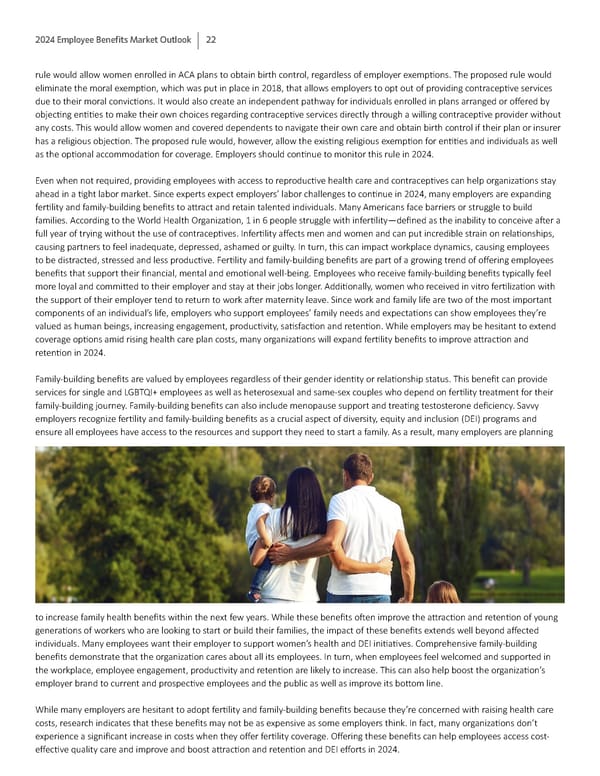2024 Employee Benefits Market Outlook 22 rule would allow women enrolled in ACA plans to obtain birth control, regardless of employer exemp琀椀ons. The proposed rule would eliminate the moral exemp琀椀on, which was put in place in 2018, that allows employers to opt out of providing contracep琀椀ve services due to their moral convic琀椀ons. It would also create an independent pathway for individuals enrolled in plans arranged or o昀昀ered by objec琀椀ng en琀椀琀椀es to make their own choices regarding contracep琀椀ve services directly through a willing contracep琀椀ve provider without any costs. This would allow women and covered dependents to navigate their own care and obtain birth control if their plan or insurer has a religious objec琀椀on. The proposed rule would, however, allow the exis琀椀ng religious exemp琀椀on for en琀椀琀椀es and individuals as well as the op琀椀onal accommoda琀椀on for coverage. Employers should con琀椀nue to monitor this rule in 2024. Even when not required, providing employees with access to reproduc琀椀ve health care and contracep琀椀ves can help organiza琀椀ons stay ahead in a 琀椀ght labor market. Since experts expect employers’ labor challenges to con琀椀nue in 2024, many employers are expanding fer琀椀lity and family-building bene昀椀ts to a琀琀ract and retain talented individuals. Many Americans face barriers or struggle to build families. According to the World Health Organiza琀椀on, 1 in 6 people struggle with infer琀椀lity—de昀椀ned as the inability to conceive a昀琀er a full year of trying without the use of contracep琀椀ves. Infer琀椀lity a昀昀ects men and women and can put incredible strain on rela琀椀onships, causing partners to feel inadequate, depressed, ashamed or guilty. In turn, this can impact workplace dynamics, causing employees to be distracted, stressed and less produc琀椀ve. Fer琀椀lity and family-building bene昀椀ts are part of a growing trend of o昀昀ering employees bene昀椀ts that support their 昀椀nancial, mental and emo琀椀onal well-being. Employees who receive family-building bene昀椀ts typically feel more loyal and commi琀琀ed to their employer and stay at their jobs longer. Addi琀椀onally, women who received in vitro fer琀椀liza琀椀on with the support of their employer tend to return to work a昀琀er maternity leave. Since work and family life are two of the most important components of an individual’s life, employers who support employees’ family needs and expecta琀椀ons can show employees they’re valued as human beings, increasing engagement, produc琀椀vity, sa琀椀sfac琀椀on and reten琀椀on. While employers may be hesitant to extend coverage op琀椀ons amid rising health care plan costs, many organiza琀椀ons will expand fer琀椀lity bene昀椀ts to improve a琀琀rac琀椀on and reten琀椀on in 2024. Family-building bene昀椀ts are valued by employees regardless of their gender iden琀椀ty or rela琀椀onship status. This bene昀椀t can provide services for single and LGBTQI+ employees as well as heterosexual and same-sex couples who depend on fer琀椀lity treatment for their family-building journey. Family-building bene昀椀ts can also include menopause support and trea琀椀ng testosterone de昀椀ciency. Savvy employers recognize fer琀椀lity and family-building bene昀椀ts as a crucial aspect of diversity, equity and inclusion (DEI) programs and ensure all employees have access to the resources and support they need to start a family. As a result, many employers are planning to increase family health bene昀椀ts within the next few years. While these bene昀椀ts o昀琀en improve the a琀琀rac琀椀on and reten琀椀on of young genera琀椀ons of workers who are looking to start or build their families, the impact of these bene昀椀ts extends well beyond a昀昀ected individuals. Many employees want their employer to support women’s health and DEI ini琀椀a琀椀ves. Comprehensive family-building bene昀椀ts demonstrate that the organiza琀椀on cares about all its employees. In turn, when employees feel welcomed and supported in the workplace, employee engagement, produc琀椀vity and reten琀椀on are likely to increase. This can also help boost the organiza琀椀on’s employer brand to current and prospec琀椀ve employees and the public as well as improve its bo琀琀om line. While many employers are hesitant to adopt fer琀椀lity and family-building bene昀椀ts because they’re concerned with raising health care costs, research indicates that these bene昀椀ts may not be as expensive as some employers think. In fact, many organiza琀椀ons don’t experience a signi昀椀cant increase in costs when they o昀昀er fer琀椀lity coverage. O昀昀ering these bene昀椀ts can help employees access cost- e昀昀ec琀椀ve quality care and improve and boost a琀琀rac琀椀on and reten琀椀on and DEI e昀昀orts in 2024.
 2024 Employee Benefits Market Outlook Page 21 Page 23
2024 Employee Benefits Market Outlook Page 21 Page 23